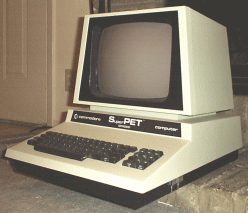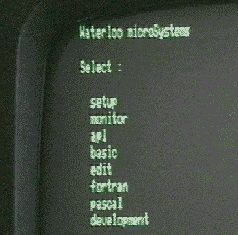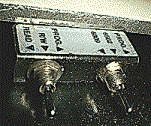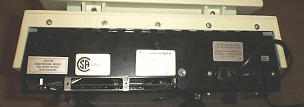



 The top of the PET line of computers was a project of the University
of Waterloo in Canada. What they produced is remarkable indeed. Based
off top-of-the-line Commodore PET technology, the SP9000
(also known as the MicroMainframe in Europe) sports 96K of RAM, true RS232,
8032 compatibility, and an architecture
and software package that make it a developers' power machine!
The top of the PET line of computers was a project of the University
of Waterloo in Canada. What they produced is remarkable indeed. Based
off top-of-the-line Commodore PET technology, the SP9000
(also known as the MicroMainframe in Europe) sports 96K of RAM, true RS232,
8032 compatibility, and an architecture
and software package that make it a developers' power machine!
 When powered on in its 6809 Programmer mode, the SuperPET brings up the menu
you see here, allowing you to select from its assortment of powerful
programming languages and development tools. The idea behind the machine
was that developers and academic types could do their work
on the SuperPET, and then upload their source back
to a mainframe or other machine using a direct RS232 connection.
When powered on in its 6809 Programmer mode, the SuperPET brings up the menu
you see here, allowing you to select from its assortment of powerful
programming languages and development tools. The idea behind the machine
was that developers and academic types could do their work
on the SuperPET, and then upload their source back
to a mainframe or other machine using a direct RS232 connection.
The powerful packages, as seen in the menu, include: RS232 configuration (Setup),
a Machine Language Monitor, an APL development package, a BASIC development
package (in addition to the standard Commodore BASIC), a powerful
text editor/terminal program, a Fortran development package,
a Pascal development package, an Assembler development package, and
(not listed) a COBOL development package.
There's much more on all of these below.
Be sure to check out the PET 2001 entry for more general information on Commodore PET computers.
Statistics, features, and SuperPET resources:
 CPU: MOS Technology 6502 AND 6809
CPU: MOS Technology 6502 AND 6809
RAM: 96 kilobytes
ROM: 48 kilobytes

 Video: MOS Technology 6545 CRTC
Video: MOS Technology 6545 CRTC
 Sound: Piezo electronic speaker.
Sound: Piezo electronic speaker.
 Ports: 6551 ACIA, MOS 6520 PIA, MOS 6522 VIA
Ports: 6551 ACIA, MOS 6520 PIA, MOS 6522 VIA
 Keyboard: Full-sized 73 key QWERTY
Keyboard: Full-sized 73 key QWERTY
Resources:
Personal Note:As a programmer, the SP9000 is easily my favorite machine, as it seems built to cater to folks who want to tinker with software and speak to their computer in many ways. Purchased back in 1996 during my initial incursion into the world of eBay, this is the first PET I ever owned.
If you find anything in here you have questions or comments about, feel
free to leave me email right here.
To return to my home page, click here.